Vladimir Nabokov, one of the most famous writers of the second half of the XX century, left St. Petersburg (at that time Petrograd) in his youth: his family moved to Germany away from the Bolsheviks, who had taken power in 1917. The house where the future writer grew up has not changed much, its aura and atmosphere are almost the same and give a clear hint of the origins of the genius of the author of «Lolita», «The Luzhin Defense» and… notes on entomology.
Vladimir Nabokov House: Address, Ticket Price, Open Hours

Address: 47, Bolshaya Morskaya street
How to get to the museum: take bus № 3, 22, 27 or trolleybus № 5 or 22 from Gostiny Dvor subway station to Isaakievskaya Ploschad (St. Isaac’s Square)
Nearest subway stations Nevsky Prospekt, Gostiny Dvor, Sadovaya, Sennaya, Spasskaya are all within walking distance.
Open hours: Tuesday – Saturday from 11:00 till 17:45
Adult ticket price: 100 rubles. There are privileges
Website: http://nabokov.museums.spbu.ru/
Exposition In The Nabokov Museum
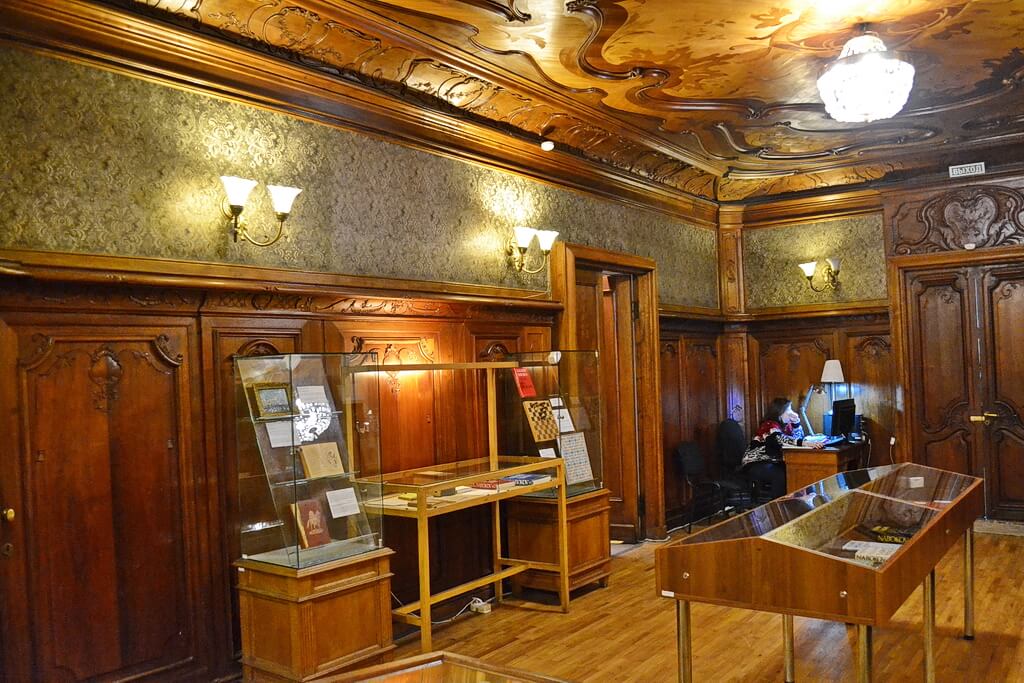
Vladimir Nabokov is beyond compare. With equal research interest, he dissects the genitals of male western pygmy blue butterflies and analyzes in his books men’s behavior, dictated by the urges of the same organ of human body. It was because of Humbert’s passions, described in his most famous book «Lolita», that Nabokov did not receive his Nobel Prize.
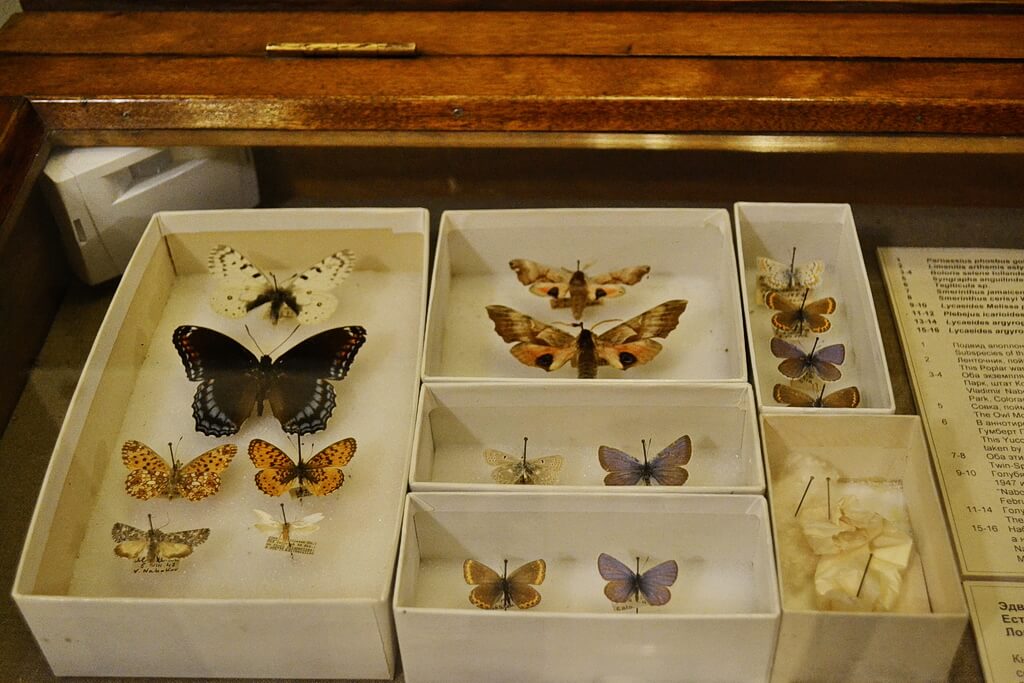
Butterflies caught by Nabokov
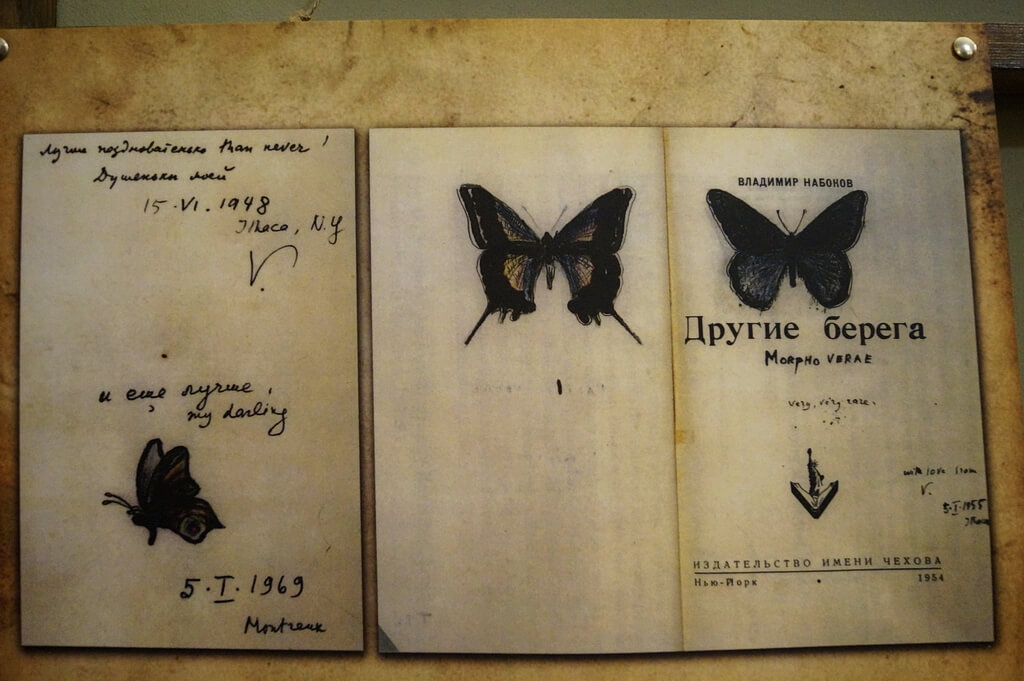
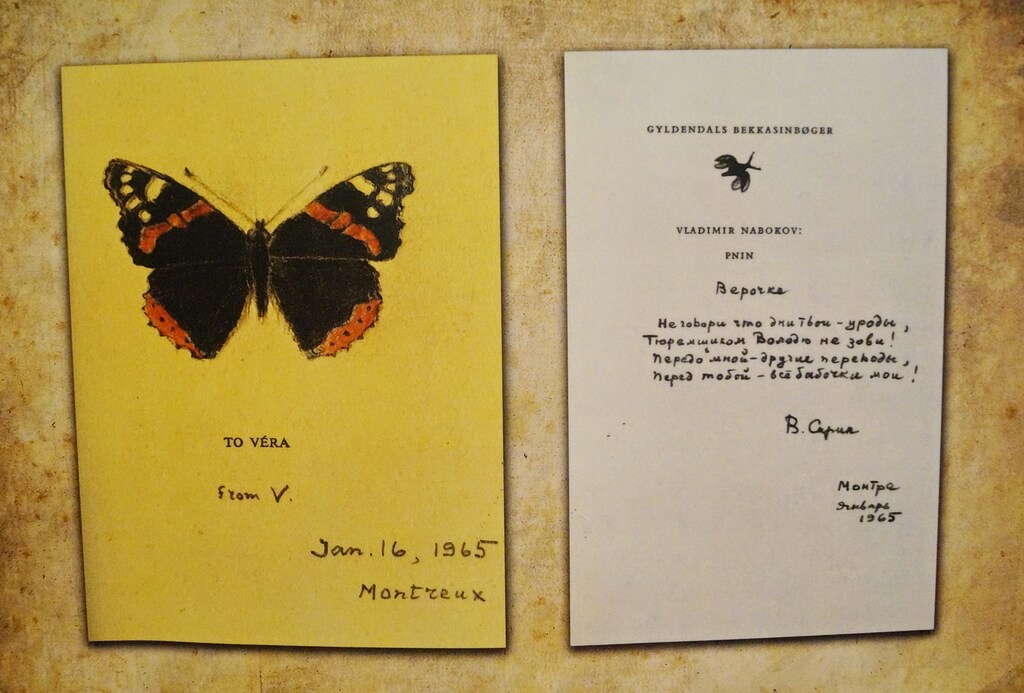
«A lot of butterflies discovered by Nabokov were named after his literary characters».
In 2014, fifty years after the Russian writer had been nominated for the Nobel prize (and he was nominated four times), the Swedish Academy disclosed documents, according to which a permanent member of the Academy Anders Esterling blocked Nabokov’s candidacy precisely for his «immoral novel». It is quite understandable: in 1955, «Lolita» was published only by Olympia Press publishing house, which printed pornographic and equivalent novels.
«Laughter in the Dark» (its original Russian title is «Camera obscura») by Nabokov deals with the affection of a middle-aged man for a 16-year-old girl resulting in a mutually parasitic relationship. The details of their passion on the pages of the book are so sexually explicit that outshine even «Lolita»!
Interestingly, a reader will not find any autobiographical evidence of the author’s suffering from very young women. His faithful companion, wise friend and wife Vera Slonim was an example of devoted love and they lived together for 52 years! Meanwhile, there were scandals that the main character in the «Ada» novel was inspired by Vera. Besides, Mr Nabokov had affairs with beautiful female students…
Accused of «atrophy of the moral sense», the author claimed that «Lolita» was «a book that tells about the sad fate of a child: a very ordinary little girl, captured by a disgusting and heartless man.»
By the way, «Lolita» was written in English. It was only in 1967, when the book was translated into Russian by Nabokov himself and published in New York City in 1967 by Phaedra Publishers. Nevertheless, Nabokov wrote, «My private tragedy, which cannot, and indeed should not, be anybody’s concern, is that I had to abandon my natural idiom, my untrammeled, rich, and infinitely docile Russian language for a second-rate brand of English.»
Nabokov used to say about himself, «My head speaks English, my heart speaks Russian and my ear speaks French.»
Interesting Facts About Nabokov’s Family
The Nabokovs were a wealthy and prominent family of the Russian nobility, and their house was close to the St Isaac’s Cathedral, on the Bolshaya Morskaya street in the centre of St. Petersburg.

Nabokov’s house was close to the St Isaac’s Cathedral

Musical instrument in Nabokov’s apartment
See the visual reconstruction of the library on the museum’s website (in Russian).
His father was the liberal lawyer, statesman, and journalist Vladimir Nabokov and his mother, Yelena Nabokova (nee Rukavishnikova), was the daughter of a millionaire gold-mine owner. Her brother, Vladimir’s uncle, left him a million-dollar inheritance. A part of this money was spent to publish the first collection of Nabokov’s poems. His maternal grandfather was a doctor, biologist, professor, and the head of the Imperial Medical and Surgical Academy, head of the Medical Service of the Russian Army.
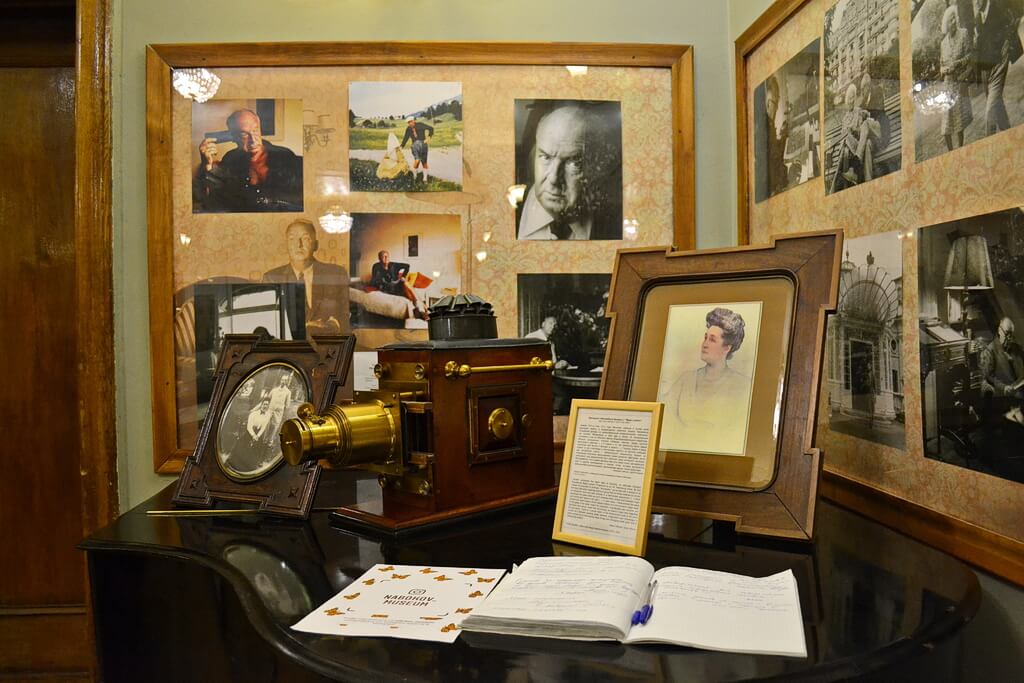
Family photos

His paternal grandfather was Russia’s Justice Minister during the reign of Alexander II and Alexander III. His paternal grandmother was the Baltic German Baroness Maria von Korff, the daughter of a German general in the service of the Russian Empire.
How many nationalities were there in this man? Jewish, Russian, German… Having absorbed Russian, French, English, German, American culture, he became a genius representative of the global culture.


The first two decades of the XX century in Russia were a time of turmoil, revolutionary moods, and social movements. The old way of life was broken, and the new one was created with great difficulties. An attempt at revolution in 1905, the beginning of the First World War in 1914, the fall of the monarchy and the Bolsheviks’ rise to power in 1917, and the Civil war… it was an extremely interesting and dangerous era, the time of such personalities as Grigory Rasputin, who walked with Nabokov on the same streets… The first twenty years of the XX century in St. Petersburg and in Russia as a whole may be another source of genius. Remember, Ayn Rand, the author of «Atlas Shrugged», grew up in St. Petersburg at the same time. By the way, she also emigrated, as well as Nabokov, first to Berlin, and then to the United States, which became her second home and where these two authors discovered their creative potential.

Landscape by Elena Nabokova, the writer’s mother
There was another interesting factor that influenced the writer’s creativity. Like his mother, he was a synesthete. An example of how Nabokov’s synesthesia manifested is associating letters of the alphabet with colors, something he discovered at an early age. His wife Vera also exhibited synesthesia.
The Nabokovs had to leave Germany after Vera, a Jew by nationality, was fired from her job on the national basis. They timely left the country, where a terrible flame of hatred and misanthropic ideology was igniting. Later, millions of victims were driven to concentration camps, leaving no hope for cultural salvation.
Fate kept this man, who timely evacuated first from Communist Russia, and then from Nazi Germany. And maybe this is also the reason why his genius was implemented.